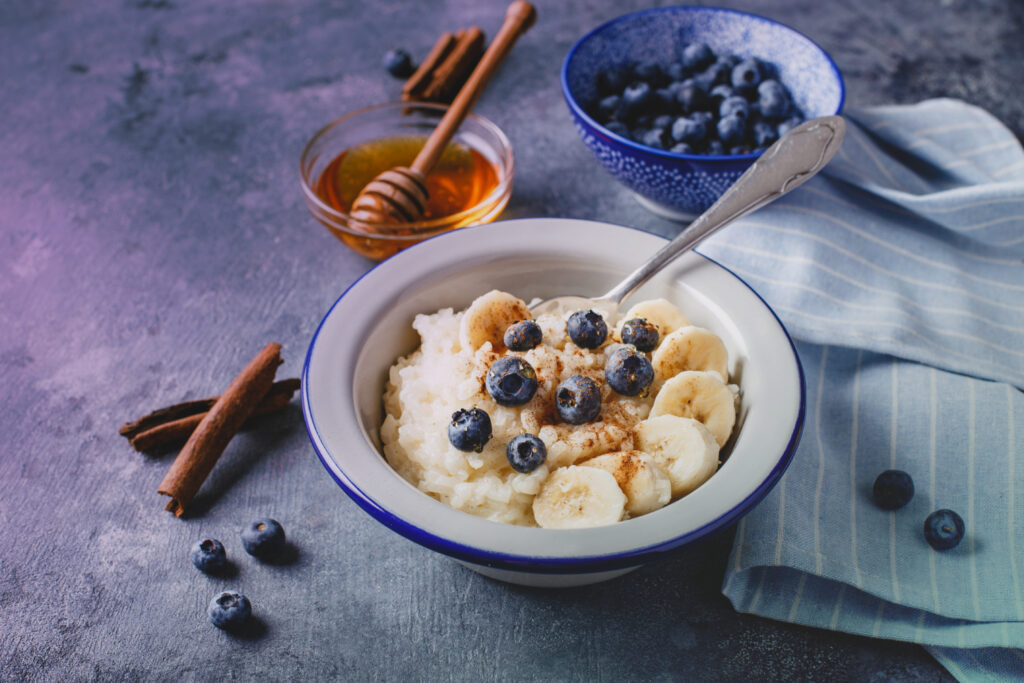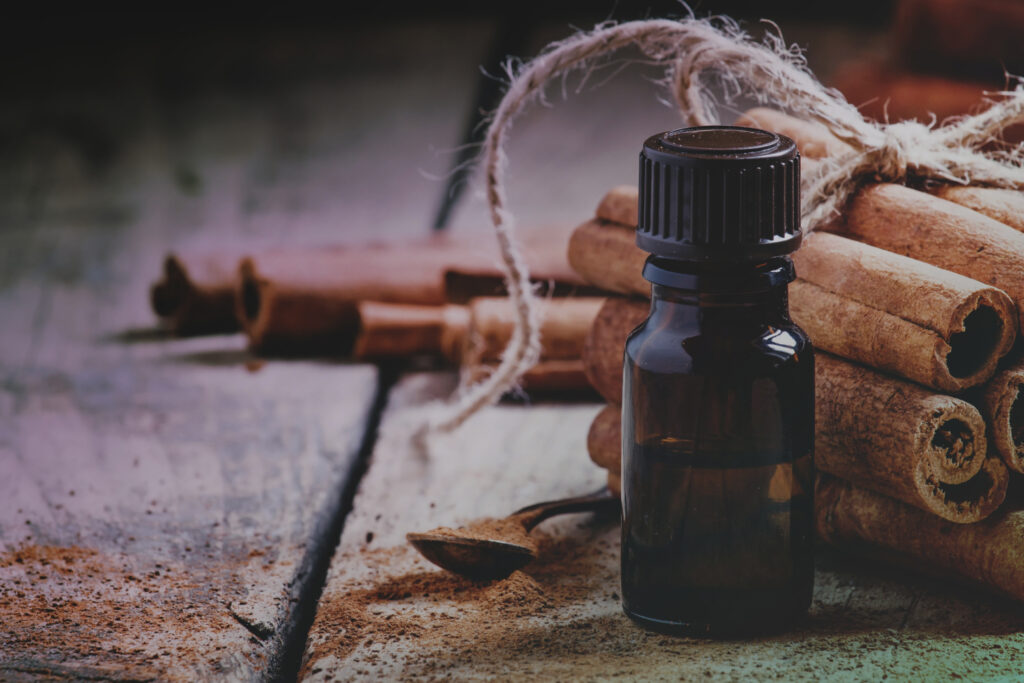You might add a pinch of nutmeg to your baking from time to time, or a dash of pepper to a freshly-made soup.
However, as holistic solutions for health and wellness continue to grow more popular, there’s one product that could change your diet forever.
Cinnamon sticks and ground cinnamon make a significant impact on all kinds of recipes.
You might have already experienced the warming sweetness of cinnamon in a cookie or smoothie. Cinnamon also has benefits to offer in savory foods, like curries and soups.
Though cinnamon essential oil and cinnamon tea products are growing increasingly popular, not everyone knows why this spice is so beneficial.
Today, we’re going to introduce you to the advantages of cinnamon and how you can add more cinnamon sticks to your diet.

The benefits of cinnamon tea, oils, and blends
Cinnamon comes from an inner layer of bark within Evergreen Cinnamomum trees. To create cinnamon sticks or powder, farmers need to remove the outer layer of bark, then carefully shave the inner bark. When the bark dries, it automatically curls into quills.
You can break quills up into cinnamon sticks or crush them into powder. Some organizations now mix cinnamon powders with carrier oils to make a cinnamon essential oil. Alternatively, you can add ground cinnamon to tea leaves for cinnamon tea.
One of the best things about cinnamon is its versatility. This warming spice works well in both sweet and savory cooking.
On top of that, besides a great taste, cinnamon sticks and byproduct also have a wide range of benefits, including:
- The ability to reduce inflammation: Antioxidants in cinnamon are anti-inflammatory which reduce the risk of heart disease, brain function issues, cancer, and more. There are 7 flavonoid compounds in cinnamon which fight inflammation in the body.
- Fighting infections: Experts believe that cinnamon essential oil boosts the performance of the immune system. The spice is anti-viral, anti-fungal, and naturally antimicrobial too.
- Improved heart health: Studies show that cinnamon tea and other products can reduce various risk factors associated with heart disease. Cinnamon reduces cholesterol levels, blood pressure, and triglycerides.
- Blood sugar stabilization: Naturally occurring compounds in cinnamon sticks improve the reaction of the body to insulin. We need insulin to keep blood sugar levels balanced. Because cinnamon improves insulin sensitivity, it could also assist in reducing the risk of type 2 diabetes.
- Brain function support: Thanks to excellent antioxidant properties, cinnamon also works against neurological disorders, like Alzheimer’s and Parkinson’s. It activates the neuro-protective proteins that reduce the risk of damage.
Getting the most from cinnamon sticks
These days, there are plenty of ways to get more cinnamon into your diet. We’ve already mentioned the rise of cinnamon tea and cinnamon essential oil. However, no matter how you choose to consume your cinnamon, there are a few tips you should keep in mind.
Here’s some expert advice on getting the most from your new dietary staple:
- Stick with Ceylon cinnamon: There are two primary kinds of cinnamon for customers to choose from. Cassia cinnamon is cheaper and easier to find in any supermarket. Ceylon cinnamon is the “true” spice, which is often more expensive and difficult to find. Ceylon has a lower coumarin content than Cassia. This reduces your risk of liver problems.
- Find the right form: From cinnamon sticks to powder and supplements, there are tons of forms to choose from. When deciding which option to buy, think about what you’re using it for. If you’re planning on seasoning your food or adding cinnamon to drinks, cinnamon sticks or powder are the best choices. If you’re taking this substance purely as a supplement, pills or an essential oil might be a better alternative.
- Know how to use it: There’s more to consider when adding a new substance to your diet than you’d think. Remember that you should check the calories of cinnamon, and the potential side-effects of taking too much before you begin. Speak to a doctor before you start changing your diet – even with natural substances. If in doubt, start small. You can always work your way up to bigger doses.
Check that you know how to properly store cinnamon and keep it fresh too. This spice needs to sit in a tightly sealed container when not in use. Keep it in a dry, cool, and dark place, and your ground cinnamon will last for up to 6 months. Cinnamon sticks can sometimes stay fresh for up to a year. You may be able to find a “best before” date on your purchase.
To extend cinnamon’s shelf-life, you can consider storing it in the refrigerator with a properly sealed container to keep out moisture. When purchasing fresh spice, choose organically grown cinnamon that hasn’t been irradiated. Make sure that the product has a sweet smell too. This should be a good indicator that you’re working with a fresh product.
Brilliant ways to add cinnamon to your food
As we mentioned above, adding cinnamon to your diet is often easier than you’d think. This versatile spice works with a wide range of flavours. Some cinnamon essential oils and similar products are also suitable for topical application – if you don’t like the taste.
One of the best ways to add cinnamon to your food is with cinnamon tea.
The benefits of cinnamon tea are impressive, ranging from improved heart health to reduced blood sugar levels. Experts believe that cinnamon helps to fight off infection.
What’s more, the positive antimicrobial properties mean that you’re more likely to fight off illnesses.
Cinnamon in hot drinks fights off the growth of fungus and bacterial. If you don’t like tea, you can simply mix some cinnamon with warm water and lemon.
Alternative options include:
- Soup: Much like adding cinnamon sticks to a hot drink, a teaspoon of cinnamon in a soup is great for unlocking some extra benefits. The dose of beneficial spice adds extra flavor, while also bringing relief from inflammation and other problems. You can experiment with all kinds of flavors when working with cinnamon. Start with a small dose and work upwards.
- High carb foods: Adding a sprinkling of cinnamon to a meal high in carbohydrates is excellent for your blood sugar levels. After eating, your blood sugar naturally rises as your stomach digests. Cinnamon slows the rise of blood sugar and helps you feel fuller for longer.
- Cinnamon supplements: If you don’t want to season your meals with cinnamon, you could consider taking a small amount post-meal as an aid for your digestive process. If you experience indigestion and heartburn regularly following a meal, cinnamon helps. The product stimulates a weak digestive system and assists with breaking down food.
- Smoothies and other drinks: A drink doesn’t have to be hot to benefit from an extra sprinkle of cinnamon. If you’re not a fan of cinnamon tea, try adding the spice to your juices or smoothies. This could be an excellent way to start your body off on the right track when you’re having breakfast.
Remember to test your reaction to cinnamon in advance before you begin adding the product to your meals. Some people simply don’t like the flavour, while others may actually discover that they’re sensitive or have an allergy to this food.
Be careful, although studies indicate that cinnamon may help with blood sugar regulation, it’s not an all-in-one cure for people with type 2 diabetes. Never stop taking a medication prescribed by your doctor in exchange for something like cinnamon.
Safely supplementing with cinnamon
Adding any kind of cinnamon or cinnamon essential oil to your diet doesn’t just reduce inflammation, it improves the way your body works. Research constantly reveals new benefits of cinnamon, from the ability to reduce your cholesterol, to changing the way your body processes sugars and fats.
However, it’s worth remembering that much of the research into the benefits of cinnamon tea and other products is still ongoing. There still needs to be a lot of proof in the human testing environment to know for certain how amazing this product can be.
Additionally, while cinnamon tastes delightful and helps the body in a range of ways, it won’t perform miracles on its own. Adding cinnamon sticks to fatty or unhealthy foods won’t lower your cholesterol or transform your diet.
As with any supplement, you need a comprehensive strategy to reach your goals.
As with any dietary change, make sure that you speak to your doctor before you start using cinnamon sticks extensively. Although most people won’t have a negative response to this product, it’s important to check with a professional.
Some people don’t know this, but taking cinnamon when on certain medications could increase your chances of negative side effects.
Want to learn more about simple ways you can turbo-charge your diet? Check out the other articles here on Rewired!
ReWired: ReThink Your Life.





